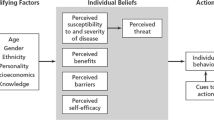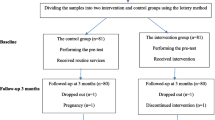Abstract
Cholangiocarcinoma (CCA) is a neoplasm known as one of the most common causes of cancer-related deaths in Southeast Asia, particularly in Thailand, Laos, and Cambodia. Prevention and health education are required. Therefore, this study aimed to determine the effectiveness of an educational intervention to prevent CCA among a rural population in Thailand based on the health belief model (HBM) and self-efficacy frameworks. In this quasi-experimental study, 60 participants (30 participants in the experimental group and 30 participants in the control group) were selected in 2017. The educational intervention for the experimental group consisted of seven training sessions (introduction to CCA, risk factors, complications, benefits and barriers to proper consumption of cooked fish, carcinogenic agents, behavioral protection, and self-efficacy in applying preventive behaviors). A questionnaire that consisted of demographic information, knowledge, and HBM constructs (perceived susceptibility, severity, benefits, barriers, cues to action, and self-efficacy) was used to measure CCA preventive behaviors before and 3 months after the intervention. Data were analyzed using SPSS-22 via chi-squared, paired t-tests, and independent samples t tests at a significance level of 0.5. Three months after the intervention, the experimental group showed a significant increase in the knowledge, perceived susceptibility, perceived severity, perceived benefits, perceived barriers, cues to action, self-efficacy, and CCA preventive behaviors compared to the control group. This study showed the effectiveness of the intervention based on the HBM constructs and self-efficacy in the adoption of CCA preventive behaviors 3 months post intervention in the risk group. Thus, these models may serve as a framework for designing and implementing educational interventions for the prevention of CCA.


Similar content being viewed by others
References
Akamatsu N, Sugawara Y, Hashimoto D (2011) Surgical strategy for bile duct cancer: advances and current limitations. World J Clin Oncol 10(2):94–107
Becker MH, Maiman LA, Kirscht JP (1974) A new approach to explaining sick role behavior in low income population. Am J Public Health 64(3):205–216
Bloom BS (1971) Handbook on formative and summative of student learning. Mc Graw-Hill Book Company, New York
Edwards SW, Spofford EM, Price C, Wright HL, Salao K, Suttiprapa S, Sripa B (2018) Opisthorchiasis-induced cholangiocarcinoma: how innate immunity may cause cancer. Adv Parasitol 101:149–176
House JS, Kahn RL (1985) Measures and concepts of social support. In: Cohen S, Syme SL (eds) Social support and health. Academic Press, New York, pp 83–108
IARC (1994) Infection with liver flukes (Opisthorchis viverrini, Opisthorchis felineus and Clonrochis sinensis). IARC Monogr Eval Carcinog Risks Hum 61:121–175
Janz NK, Becker MH (1984) The health belief model: a decade later. Health Educ Q 11(1):1–47
Kaewpitoon N, Kaewpitoon SJ, Pengsaa P, Pilasri C (2007) Knowledge, attitude and practice related to liver fluke infection in northeast Thailand. World J Gastroenterol 13(12):1837–1840
Kaewpitoon N, Kaewpitoon SJ, Pengsaa P (2008) Opisthorchiasis in Thailand: review and current status. World J Gastroenterol 14(15):2297–2302
Kaewpitoon N, Kootanavanichpong N, Kompor P, Chavenkun W, Kujapun J, Norkaew J, Ponphimai S, Matrakool L, Tongtawee T, Panpimanmas S, Rujirakul R, Padchasuwan N, Pholsripradit P, Eksanti T, Phatisena T, Loyd RA, Kaewpitoon SJ (2015) Review and current status of Opisthorchis viverrini infection at the community level in Thailand. Asian Pac J Cancer Prev 16(16):6825–6830
Kaewpitoon SJ, Loyd RA, Rujirakul R, Wakkuwattapong P, Tongtawee T, Matrakool L et al (2016a) Primary care intervention to prevent and control cholangiocarcinoma: lesson from Nakhon Ratchasima, Thailand. J Med Assoc Thail 99(Suppl 7):S144–S150
Kaewpitoon SJ, Rujirakul R, Loyd RA, Panpimanmas S, Matrakool L, Tongtawee T, Kompor P, Norkaew J, Chavengkun W, Wakkhuwattapong P, Kujapun J, Ponphimai S, Phatisena T, Eaksunti T, Polsripradist P, Joosiri A, Sukkasam I, Padchasuwan N, Kaewpitoon N (2016b) Surveillance of populations at risk of cholangiocarcinoma development in rural communities of Thailand using the Korat-CCA verbal screening test. Asian Pac J Cancer Prev 17(4):2205–2209
Kaewpitoon SJ, Rujirakul R, Wakkuwattapong P, Benjaoran F, Norkaew J, Kujapun J, Ponphimai S, Chavenkun W, Kompor P, Padchasuwan N, Kaewpitoon N (2016c) Development of a health education modification program regarding liver flukes and cholangiocarcinoma in high risk areas of Nakhon Ratchasima province using self-efficacy and motivation theory. Asian Pac J Cancer Prev 17(6):2947–2951
Kaewpitoon SJ, Thanapatto S, Nuathong W, Rujirakul R, Wakkuwattapong P, Norkaew J, Kujapun J, Padchasuwan N, Kaewpitoon N (2016d) Effectiveness of a health educational program based on self-efficacy and social support for preventing liver fluke infection in rural people of Surin province, Thailand. Asian Pac J Cancer Prev 17(3):1111–1114
Kaewponpek R (2009) The effectiveness of application by protection motivation theory and social support for preventive behavior of opisthorchiasis to cholangiocarcinoma among primary school student in Saithong sub district, Subunreuang district, Nonbualamphu province, Thailand. Master of Public Health thesis in Health Education and Health Promotion, Graduate School, Khon Kaen University. Thai
Kompor P, Muang Karn R, Norkaew J, Kujapun J, Photipim M, Ponphimai S et al (2016) Population-based intervention for liver fluke prevention and control in Meuang Yang district, Nakhon Ratchasima province, Thailand. Asian Pac J Cancer Prev 17(2):685–689
Landis SH, Murray T, Bolden S, Wingo PA (1998) Cancer statistics, 1998. CA Cancer J Clin 48(1):6–29
Padchasuwan N, Kaewpitoon SJ, Rujirakul R, Wakkuwattapong P, Norkaew J, Kujapun J, Ponphimai S, Chavenkun W, Kompor P, Kaewpitoon N (2016) Modifying health behavior for liver fluke and cholangiocarcinoma prevention with the health belief model and social support theory. Asian Pac J Cancer Prev 17(8):3721–3725
Patel T (2002) Worldwide trends in mortality from biliary tract malignancies. BMC Cancer 2:10
Phatisena P, Eaksanti T, Wichantuk P, Tritipsombut J, Kaewpitoon SJ, Rujirakul R, Wakkhuwattapong P, Tongtawee T, Matrakool L, Panpimanmas S, Norkaew J, Kujapun J, Chavengkun W, Kompor P, Pothipim M, Ponphimai S, Padchasuwan N, Kaewpitoon N (2016) Behavioral modification regarding liver fluke and cholangiocarcinoma with a health belief model using integrated learning. Asian Pac J Cancer Prev 17(6):2889–2894
Seti S (2009) The effect of comparison preventive liver fluke behavior between application health belief model with participation and handbook in risk group’s cancer of liver, Nonsang District, Nongbualamphu Province. Master of Public Health thesis in Health Education and Health Promotion, Graduate School, Khon Kaen University. Thai.
Shin HR, Oh JK, Masuyer E (2010) Epidemiology of cholangiocarcinoma: an update focusing on risk factors. Cancer Sci 101(3):579–585
Sithithaworn P, Andrews RH, Nguyen VD, Wongsaroj T, Sinuon M, Odermatt P et al (2012) The current status of opisthorchiasis and clonorchiasis in the Mekong Basin. Parasitol Int 61(1):10–16
Sripa B (2008) Concerted action is needed to tackle liver fluke infections in Asia. PLoS Negl Trop Dis 2(5):e232
Sripa B, Kaewkes S, Sithithaworn P, Mairiang E, Laha T, Smout M, Pairojkul C, Bhudhisawasdi V, Tesana S, Thinkamrop B, Bethony JM, Loukas A, Brindley PJ (2007) Liver fluke induces cholangiocarcinoma. PLoS Med 4(7):e201
Sripa B, Kaewkes S, Intapan PM, Maleewong W, Brindley PJ (2010) Food-borne trematodiases in Southeast Asia: epidemiology, pathology, clinical manifestation and control. Adv Parasitol 72:305–350
Sripa B, Tangkawattana S, Laha T, Kaewkes S, Mallory FF, Smith JF, Wilcox BA (2015) Toward integrated opisthorchiasis control in northeast Thailand: the Lawa project. Acta Trop 141(Pt B):361–367
Thongnamuang S, Duangsong R (2012) The effectiveness of application by health belief model and social support for preventive behavior of opisthorchiasis and cholangiocarcinoma among primary school students in Moeiwadi district, Roi-Et province, Thaiiland. KKU Res J (GS) 12(2):80–91
Viriuagul C (2015) Effectiveness of health belief regarding health modification in the population at risk for liver cancer and cholangiocarcinoma in Kokkland sub-district, Lau Amnat, Amnat Charoen province, Thailand. J ODPC 10th Ubon Ratchathani 13(1):43–51
Wongsaroj T, Nithikathkul C, Rojkitikul W, Nakai W, Royal L, Rammasut P (2014) National survey of helminthiasis in Thailand. Asian Biomed 8(6):779–783
Funding
The present study was supported by a grant from the Parasitic Disease Research Center, Institute of Medicine, and the SUT research and development fund, Suranaree University of Technology (SUT), Thailand.
Author information
Authors and Affiliations
Corresponding author
Ethics declarations
Conflicts of Interest
The authors declare that they have no conflict of interest.
Rights and permissions
About this article
Cite this article
Srithongklang, W., Panithanang, B., Kompor, P. et al. Effect of Educational Intervention Based on the Health Belief Model and Self-Efficacy in Promoting Preventive Behaviors in a Cholangiocarcinoma Screening Group. J Canc Educ 34, 1173–1180 (2019). https://doi.org/10.1007/s13187-018-1424-7
Published:
Issue Date:
DOI: https://doi.org/10.1007/s13187-018-1424-7




